| Listing 11 - 17 of 17 | << page >> |
Sort by
|
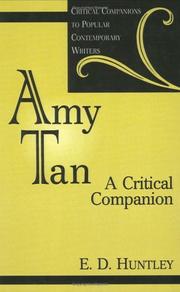
ISBN: 0313302073 0313007888 9780313007880 9780313302077 Year: 1998 Volume: *3 Publisher: Westport, Conn. London Greenwood Press
Abstract | Keywords | Export | Availability | Bookmark
 Loading...
Loading...Choose an application
- Reference Manager
- EndNote
- RefWorks (Direct export to RefWorks)
Chinees Amerikaanse vrouwen in de literatuur --- Chinese American women in literature --- Chinese Americans in literature --- Chinese Amerikanen in literatuur --- Femmes chino-americaines dans la littérature --- Sino-Américains dans la littérature --- Tan, Amy --- Criticism and interpretation --- Women and literature --- United States --- History --- 20th century --- Chinese American women in literature. --- Chinese Americans in literature. --- Tan, Eimi --- Tan, Enmei --- טאן, אמי --- 谭恩美 --- Criticism and interpretation.
Book
ISBN: 0080374638 0080374646 9780080374635 Year: 1990 Publisher: New York Pergamon
Abstract | Keywords | Export | Availability | Bookmark
 Loading...
Loading...Choose an application
- Reference Manager
- EndNote
- RefWorks (Direct export to RefWorks)
American literature --- American literature --- American literature --- Chinese Americans in literature --- Chinese American women in literature --- Chinese American women --- Women and literature --- Chinese American authors --- History and criticism --- Chinese influences --- Women authors --- History and criticism --- Intellectual life --- China --- In literature.
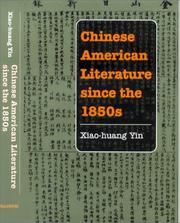
ISBN: 0252025245 Year: 2000 Publisher: Urbana University of Illinois press
Abstract | Keywords | Export | Availability | Bookmark
 Loading...
Loading...Choose an application
- Reference Manager
- EndNote
- RefWorks (Direct export to RefWorks)
American literature --- Comparative literature --- Chinese literature --- anno 1800-1999 --- S16/0480 --- S16/0477 --- China: Literature and theatrical art--Works originally written in another language than Chinese (e.g. Pearl Buck, Han Suyin, Rechter Ti-verhalen, overseas Chinese) --- China: Literature and theatrical art--Literature of/on minorities --- Chinese Americans in literature. --- Chinese Americans --- Chinese American authors --- History and criticism. --- Chinese influences. --- Intellectual life. --- Chinese Americans in literature --- Chinese --- Ethnology --- English literature --- Agrarians (Group of writers) --- Chinese American authors&delete& --- History and criticism --- Chinese influences --- Intellectual life
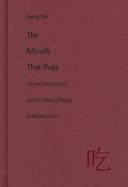
ISBN: 0822323087 0822323419 0822398516 1322141045 Year: 1999 Publisher: Durham Duke university press
Abstract | Keywords | Export | Availability | Bookmark
 Loading...
Loading...Choose an application
- Reference Manager
- EndNote
- RefWorks (Direct export to RefWorks)
The Chinese ideogram chi is far richer in connotation than the equivalent English verb “to eat.” Chi can also be read as “the mouth that begs for food and words.” A concept manifest in the twentieth-century Chinese political reality of revolution and massacre, chi suggests a narrative of desire that moves from lack to satiation and back again. In China such fundamental acts as eating or refusing to eat can carry enormous symbolic weight. This book examines the twentieth-century Chinese political experience as it is represented in literature through hunger, cooking, eating, and cannibalizing. At the core of Gang Yue’s argument lies the premise that the discourse surrounding the most universal of basic human acts—eating—is a culturally specific one.Yue’s discussion begins with a brief look at ancient Chinese alimentary writing and then moves on to its main concern: the exploration and textual analysis of themes of eating in modern Chinese literature from the May Fourth period through the post-Tiananmen era. The broad historical scope of this volume illustrates how widely applicable eating-related metaphors can be. For instance, Yue shows how cannibalism symbolizes old China under European colonization in the writing of Lu Xun. In Mo Yan’s 1992 novel Liquorland, however, cannibalism becomes the symbol of overindulgent consumerism. Yue considers other writers as well, such as Shen Congwen, Wang Ruowang, Lu Wenfu, Zhang Zianliang, Ah Cheng, Zheng Yi, and Liu Zhenyun. A special section devoted to women writers includes a chapter on Xiao Hong, Wang Anyi, and Li Ang, and another on the Chinese-American women writers Jade Snow Wong, Maxine Hong Kingston, and Amy Tan. Throughout, the author compares and contrasts the work of these writers with similarly themed Western literature, weaving a personal and political semiotics of eating.The Mouth That Begs will interest sinologists, literary critics, anthropologists, cultural studies scholars, and everyone curious about the semiotics of food.
Chinese literature --- Politics in literature. --- Hunger --- Littérature chinoise --- Politique dans la littérature --- Faim --- History and criticism. --- Histoire et critique --- S21/0600 --- S16/0195 --- S16/0170 --- China: Medicine, public health and food--Chinese food and cookery, (incl. tea) --- China: Literature and theatrical art--Thematic studies --- China: Literature and theatrical art--General works on modern literature --- American literature --- Chinese Americans in literature. --- Chinese Americans --- Hunger in literature. --- Chinese American authors --- Intellectual life. --- Littérature chinoise --- Politique dans la littérature --- Chinese Americans in literature --- Hunger in literature --- Politics in literature --- Political science in literature --- Chinese --- Ethnology --- English literature --- Agrarians (Group of writers) --- Chinese American authors&delete& --- History and criticism --- Intellectual life
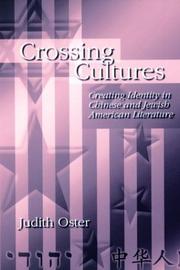
ISBN: 082621486X 9780826214867 0826264492 9780826264497 Year: 2003 Publisher: Columbia : University of Missouri Press,
Abstract | Keywords | Export | Availability | Bookmark
 Loading...
Loading...Choose an application
- Reference Manager
- EndNote
- RefWorks (Direct export to RefWorks)
American literature --- Chinese Americans in literature. --- Chinese Americans --- Culture in literature. --- Identity (Psychology) in literature. --- Jews in literature. --- Jews --- Judaism and literature --- Chinese American authors --- History and criticism. --- Jewish authors --- Intellectual life. --- Cahan, Abraham, 1860-1951. The Rise of David Levinsky --- Chinese Americans in literature --- Chinese Amerikanen in literatuur --- Culture dans la littérature --- Culture in literature --- Cultuur in de literatuur --- Identiteit (Psychologie) in de literatuur --- Identiteit in de literatuur --- Identity (Psychology) in literature --- Identity in literature --- Identité (Psychologie) dans la littérature --- Identité dans la littérature --- Jews in literature --- Joden in de literatuur --- Juifs dans la littérature --- Sino-Américains dans la littérature --- Chinese --- Ethnology --- English literature --- Agrarians (Group of writers) --- Chinese American authors&delete& --- History and criticism --- Jewish authors&delete& --- Intellectual life --- United States --- Love in literature --- Roth, Henry --- Roth, Philip --- Criticism and interpretation --- Chin, Frank Chew --- Gold, Herbert --- Hoffman, Eva --- Yezierska, Anzia --- Kingston, Maxine Hong --- Tan, Amy
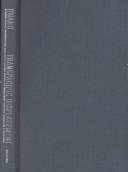
ISBN: 0520928148 1282355988 9786612355981 1597349631 9780520928145 0585466017 9780585466019 9781597349635 6612355980 0520228863 9780520228863 0520232232 9780520232235 9781282355989 Year: 2002 Publisher: Berkeley University of California Press
Abstract | Keywords | Export | Availability | Bookmark
 Loading...
Loading...Choose an application
- Reference Manager
- EndNote
- RefWorks (Direct export to RefWorks)
Yunte Huang takes a most original "ethnographic" approach to more and less well-known American texts as he traces what he calls the transpacific displacement of cultural meanings through twentieth-century America's imaging of Asia. Informed by the politics of linguistic appropriation and disappropriation, Transpacific Displacement opens with a radically new reading of Imagism through the work of Ezra Pound and Amy Lowell. Huang relates Imagism to earlier linguistic ethnographies of Asia and to racist representations of Asians in American pop culture, such as the book and movie character Charlie Chan, then shows that Asian American writers subject both literary Orientalism and racial stereotyping to double ventriloquism and countermockery. Going on to offer a provocative critique of some textually and culturally homogenizing tendencies exemplified in Maxine Hong Kingston's work and its reception, Huang ends with a study of American translations of contemporary Chinese poetry, which he views as new ethnographies that maintain linguistic and cultural boundaries.
Intertextuality. --- Ethnology in literature. --- Immigrants in literature. --- Chinese Americans in literature. --- Chinese Americans in mass media. --- Chinese Americans --- American literature --- Chinese literature --- Criticism --- Semiotics --- Influence (Literary, artistic, etc.) --- Mass media --- Chinese --- Ethnology --- English literature --- Agrarians (Group of writers) --- Intellectual life. --- Chinese influences. --- Appreciation --- History and criticism. --- Chinese American authors --- Chinese Americans in literature --- Chinese Americans in mass media --- Ethnology in literature --- Immigrants in literature --- Intertextuality --- Chinese American authors&delete& --- History and criticism --- Chinese influences --- Intellectual life --- amy lowell. --- appropriation. --- asia. --- chinese poetry. --- critique. --- cultural history. --- cultural studies. --- disappropriation. --- displacement. --- ethnographer. --- ethnographic. --- ethnography. --- ezra pound. --- imagism. --- imagist poets. --- linguistic ethnography. --- linguistic theory. --- linguistics. --- race issues. --- race. --- racial stereotypes. --- racism. --- social history. --- social studies. --- stereotypes. --- transpacific.
Book
ISBN: 0804794758 9780804794756 9780804789646 0804789649 Year: 2015 Publisher: Stanford, California
Abstract | Keywords | Export | Availability | Bookmark
 Loading...
Loading...Choose an application
- Reference Manager
- EndNote
- RefWorks (Direct export to RefWorks)
Mark Twain (Samuel Langhorne Clemens, 1835–1910) has had an intriguing relationship with China that is not as widely known as it should be. Although he never visited the country, he played a significant role in speaking for the Chinese people both at home and abroad. After his death, his Chinese adventures did not come to an end, for his body of works continued to travel through China in translation throughout the twentieth century. Were Twain alive today, he would be elated to know that he is widely studied and admired there, and that Adventures of Huckleberry Finn alone has gone through no less than ninety different Chinese translations, traversing China, Taiwan, and Hong Kong. Looking at Twain in various Chinese contexts—his response to events involving the American Chinese community and to the Chinese across the Pacific, his posthumous journey through translation, and China's reception of the author and his work, Mark Twain in China points to the repercussions of Twain in a global theater. It highlights the cultural specificity of concepts such as "race," "nation," and "empire," and helps us rethink their alternative legacies in countries with dramatically different racial and cultural dynamics from the United States.
Chinese Americans in literature. --- Race relations in literature. --- Twain, Mark, --- Twain, Mark --- Tvėn, Mark --- Tuėĭn, Mark --- Tuwayn, Mārk --- Twayn, Mārk --- Tʻu-wen, Ma-kʻo --- Tven, M. --- Touen, Makū --- Twain, Marek --- Make Tuwen --- Tuwen, Make --- Make Teviin --- Твен, Марк --- Touain, Mark --- טבןַ, מרק, --- טוויין, מארק, --- טוויין, מרק, --- טווין, מארק, --- טווין, מרק, --- טווען, מארק, --- טוין, מרק, --- טװען, מארק, --- טװײן, מארק, --- 馬克吐温, --- Tuvāyn, Mārk --- Tvāyn, Mārk --- تواين، مارک --- Clemens, Samuel Langhorne --- Snodgrass, Quintus Curtius --- Conte, Louis de --- Knowledge --- Chinese Americans. --- Appreciation --- Influence.
| Listing 11 - 17 of 17 | << page >> |
Sort by
|

 Search
Search Feedback
Feedback About UniCat
About UniCat  Help
Help News
News